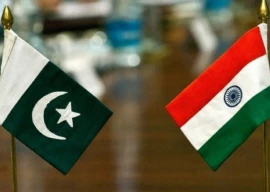
ISLAMABAD:
After the completion of the judicial inquiry into journalist Saleem Shahzad’s murder, the Human Rights Watch (HRW) has expressed concern over the commission’s inability to name the culprits taking specific notice of Pakistan’s top spy agency’s role in such incidents.
A news release by the Human Rights Watch on Monday claimed that it had extensively documented the Inter-Services Intelligence’s (ISI) alleged intimidation, torture, enforced disappearances, and killings of many journalists, and feared that the commission’s failure in naming a culprit hinted back to ISI’s “stronghold over the country’s judicial system.”
HRW Asia Director Brad Adams, in the release, said: “The commission’s failure to get to the bottom of the Shahzad killing illustrates the ability of the ISI to remain beyond the reach of Pakistan’s criminal justice system… The government still has the responsibility to identify those responsible for Shahzad’s death and hold them accountable, no matter where the evidence leads.”
Adams added that Shahzad had made it clear to the HRW that should he be killed, the ISI should be considered the principal suspect. “He had not indicated he was afraid of being killed by militant groups or anybody else.”
The HRW release said that the power of the ISI over the commission was visible from the fact that journalist Umar Cheema was not called to record his statements in the case. Cheema was also abducted, tortured and then dumped 120 km from his residence in Islamabad in September 2010. Cheema had alleged that his abductors were from Pakistan’s intelligence agencies.
It is inexplicable that the commission failed to seek Cheema’s testimony despite his very public allegations against the ISI and repeated offers to testify before the commission, HRW said.
“ISI abuses will only stop if it is subjected to the rule of law, civilian oversight, and public accountability,” Adams said. “It is the government’s duty to insist on such accountability and the military’s duty to submit to it. The ISI needs to stop acting as a state within a state.”
Review meeting of the commission
Representatives of the journalist community expressed concerns over the findings of the judicial inquiry report into Shahzad’s murder and suggested a ‘parliamentary oversight’ referring to the role of the country’s secret agencies.
Members of the Media Commission of Pakistan (MCP) and South Asian Free Media Association (SAFMA) floated the idea while reviewing the judicial inquiry report.
The participants stressed that parliamentarians and media organisations should play an active role to highlight this issue. They were of the view that ISI’s role must be monitored by a minister or an ombudsman.
SAFMA President Imtiaz Alam said: “It is unfortunate that no tangible steps have been taken to arrest the hands behind the murder of Shahzad.”
He reiterated the view that the commission had not completely investigated the policies and practices of the ISI and now parliamentarians must introduce a bill to monitor the role of the spy agencies.
Shahzad was abducted while driving from his house in Islamabad on May 29 last year, two days after he alleged in an article that al Qaeda had infiltrated the Pakistan Navy.
A judicial commission, headed by Supreme Court judge Justice Saqib Nisar, presented its report to the prime minister after six months of its formation but did not hold anyone responsible for the abduction, torture and murder of the journalist.
Published in The Express Tribune, January 31st, 2012.
COMMENTS (3)
Comments are moderated and generally will be posted if they are on-topic and not abusive.
For more information, please see our Comments FAQ























































^ And we have seen that drones are stopped and Guantanamo Bay has been closed becasue of HRW criticism! -_-
You mean the same HRW that criticizes the CIA drone program and calls for the closure of Guantanamo?
HRW is an arm of American government.It is used to weaken any country or institution that is a threat to American interest.